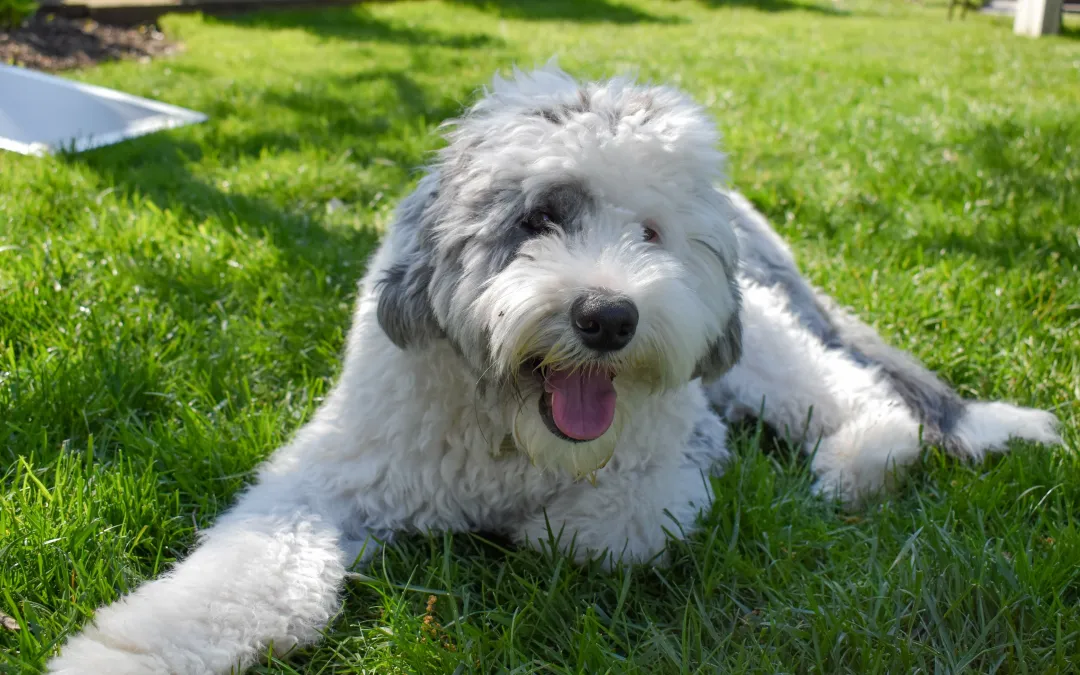Are you wondering why your Sheepadoodle is aggressive? Dealing with unexpected behavior in your fluffy, lovable pup can be frustrating and concerning.
As a Sheepadoodle owner myself, I understand how important it is to keep your furry friend happy and safe. With insights rooted in real-world experience and expert knowledge, I’ll guide you beyond generic advice to tackle aggression effectively.
Sheepadoodles are cherished for their gentle, playful nature, but behaviors like growling or nipping can arise. Addressing the root causes—whether it’s herding instincts, lack of socialization, or something else—can restore peace to your home.
In this guide, you’ll discover the reasons behind Sheepadoodle aggression, practical solutions for training and socializing, and tips to ensure your pup thrives.
Let’s get started!
Introduction
Sheepadoodles are known for being friendly, gentle, and generally non-aggressive dogs that make great family pets. However, if you’re noticing unexpected aggression in your Sheepadoodle, it’s natural to be concerned and want answers. At Sheepadoodle, your trusted resource for breed education, we’re here to help. In this guide, we’ll explore the common causes of aggression, clear up myths about Sheepadoodle behavior, and offer practical solutions so you can better understand and manage your dog’s temperament.
Understanding Sheepadoodle Temperament

Sheepadoodles are known for being gentle, intelligent, and playful dogs that usually make great family companions. Their friendly nature comes from their mix of Poodle and Old English Sheepdog genetics. The Poodle adds smarts and a calm attitude, while the Old English Sheepdog brings a loving, protective side along with some natural herding instincts.
Some folks wonder if Sheepadoodles are prone to aggression, but that’s mostly a myth. Like any dog, their behavior depends a lot on how they’re raised, socialized, and trained from an early age. Early socialization and consistent training play a huge role in shaping a Sheepadoodle’s temperament, helping them grow into well-behaved, confident pets that are comfortable around people and other animals.
At Sheepadoodle, we’re here to help you understand your pup better and offer advice on how to support their best behavior.
Common Causes of Aggression in Sheepadoodles
If your Sheepadoodle is showing aggressive behavior, it’s often related to a few key causes worth understanding.
Herding Instincts
Thanks to their Old English Sheepdog roots, Sheepadoodles can have a natural herding urge. This might show as nipping at heels or chasing moving things like kids or other pets — it’s their way of trying to control or guide movement.
Lack of Socialization
Without enough exposure to different people, animals, and environments early on, Sheepadoodles may become fearful or defensive, reacting with aggression to strangers or unfamiliar dogs.
Environmental Stressors
Changes like a new home, loud noises (think fireworks or construction), or disrupted daily routines can make your dog anxious or stressed, which sometimes leads to irritability or growling.
Health Issues
Pain or medical problems often show up as sudden grumpiness or aggression. If your dog normally sweet starts snapping or seems on edge, a vet check is essential to rule out discomfort.
Training Gaps
Unchecked behaviors such as resource guarding (snapping over toys or food) or territorial aggression can become bigger problems if not addressed early through proper training and boundaries.
Adolescence Phase
Sheepadoodles, like many dogs, go through a teen phase around 6 to 18 months old. During this time, their behavior can shift—testing limits and occasionally displaying more aggressive or stubborn traits before settling down.
By spotting these common causes, you can better understand why your Sheepadoodle might act aggressively and start addressing the root issues effectively.
How to Identify Aggressive Behavior
Knowing the difference between normal Sheepadoodle play and true aggression can be tricky. Watch out for clear signs like growling, snapping, barking with raised hackles, or lunging. These behaviors often mean your dog is feeling threatened or upset.
It’s important to tell aggression apart from playful nibbling or herding instincts. Playful behavior usually has a loose body, wagging tail, and pauses. Herding actions might involve nipping but without the intense stare or stiff posture aggression shows.
Be concerned if the aggressive behavior happens often, with high intensity, or in situations where your dog should feel safe. Also, pay attention if it escalates or doesn’t respond to your corrections.
Keeping a behavior log can help track patterns and triggers. Note down when your Sheepadoodle acts aggressively, what was happening before, and how they responded afterward. This info is useful for trainers or vets if you need extra help managing dog aggression.
Practical Solutions to Manage and Prevent Aggression in Sheepadoodles
Managing your Sheepadoodle’s aggression starts with consistent training and smart strategies. Here’s what you can do:
Training Techniques
- Use positive reinforcement to redirect unwanted herding or nipping behavior. Reward calm and appropriate actions with treats or praise.
- Teach basic commands like sit, stay, and leave it to help control their natural instincts.
- Consider professional training options, whether online courses or local certified trainers, for personalized guidance.
Socialization Strategies
- Gradually expose your Sheepadoodle to different people, pets, and environments to reduce fear and discomfort.
- Puppy classes and supervised playdates are great for encouraging positive social interactions early on.
Environmental Adjustments
- Create a calm and predictable home environment to reduce stress. Keep routines steady.
- Minimize loud noises, crowded spaces, or sudden changes that might upset your dog.
Health Checks
- If aggression seems sudden or unusual, consult your vet to rule out pain or medical issues.
- Regular checkups are important to keep your Sheepadoodle healthy and happy.
Exercise and Mental Stimulation
- Provide daily physical exercise like walks and fetch to burn off excess energy.
- Use puzzle toys or training games for mental stimulation to prevent boredom-related aggression.
When to Seek Professional Help
- If aggression persists or worsens, it’s time to contact a dog behaviorist or certified trainer.
- Look for local trainers through directories or community groups focused on dog behavior.
Taking these steps can help you manage and prevent aggression, keeping your Sheepadoodle a happy, well-behaved companion.
Local Resources for Sheepadoodle Owners
Having a strong support network can make a huge difference when managing your Sheepadoodle’s behavior and socialization. Being part of a community gives you access to advice, encouragement, and shared experiences that are especially helpful when dealing with aggression or training challenges.
Finding Trainers and Behaviorists Nearby
Look for professional dog trainers or certified behaviorists in your city or neighborhood. Many trainers specialize in managing dog aggression and herding instincts, so check their credentials and reviews. Websites like the Association of Professional Dog Trainers (APDT) or local pet stores can help you find reputable experts close to you.
Join Sheepadoodle Community Forums
Online forums and Facebook groups dedicated to Sheepadoodle owners are great for sharing stories, tips, and solutions. These platforms offer real-time advice and allow you to connect with others facing similar challenges. You’ll find discussions on Sheepadoodle behavior, training approaches, and updates on breed-specific issues.
Attend Local Pet Events and Meetups
Look out for dog meetups, puppy classes, or pet-related community events in your area. These provide safe and controlled environments for your Sheepadoodle to socialize with other dogs and people. Regular social exposure helps reduce fear or territorial tendencies, making your pet more confident and less aggressive over time.
Together, these resources give you the tools and support to keep your Sheepadoodle happy, healthy, and well-behaved. Don’t hesitate to tap into your local network—that’s what makes a difference.
Preventive Tips for a Happy Non Aggressive Sheepadoodle
Starting training and socialization early is key to keeping your Sheepadoodle friendly and well-behaved. Here’s how to set them up for success:
- Begin in Puppyhood: Introduce your Sheepadoodle to different people, pets, and environments early. Puppy socialization techniques help them feel comfortable and safe in new situations.
- Keep a Consistent Routine: Dogs thrive on stability. Regular feeding times, walks, and play sessions help reduce anxiety and prevent unwanted behaviors.
- Build a Strong Bond: Spend quality time playing and showing affection. A confident, loved dog is less likely to develop aggression.
- Watch Behavior Closely: Don’t ignore small signs of frustration or fear. Catch and correct problem behaviors early before they become serious.
- Use Positive Training: Reward good behavior rather than punishing bad. This encourages your Sheepadoodle to repeat positive actions and strengthens your bond.
Following these simple steps will help you raise a happy, balanced Sheepadoodle that’s friendly and safe for your family. For more on grooming and care that supports good behavior check out our guide on Sheepadoodle grooming.
FAQs about Sheepadoodle Aggression
Is aggression common in Sheepadoodles
No, Sheepadoodles are generally friendly and gentle. Aggression is not typical and usually comes from specific causes like lack of socialization or fear.
Can training fix my Sheepadoodle’s aggression
Yes, with consistent positive reinforcement and the right techniques, most aggressive behaviors can be managed or reduced. Early and ongoing training is key.
How do I know if my Sheepadoodle’s aggression is serious
Watch for frequent growling, snapping, or lunging that happens without clear triggers or gets worse over time. If you feel unsafe or your dog does, it’s serious enough to seek help.
Are Sheepadoodles safe with kids despite herding instincts
Yes, they usually are. Their herding instincts might cause some nipping or chasing, but with proper training and supervision, they make great family dogs.
Where can I find a dog behaviorist near me
You can find certified trainers and behaviorists through local pet centers, veterinary offices, or online directories like the Association of Professional Dog Trainers. Also, check Sheepadoodle community forums for local recommendations.

